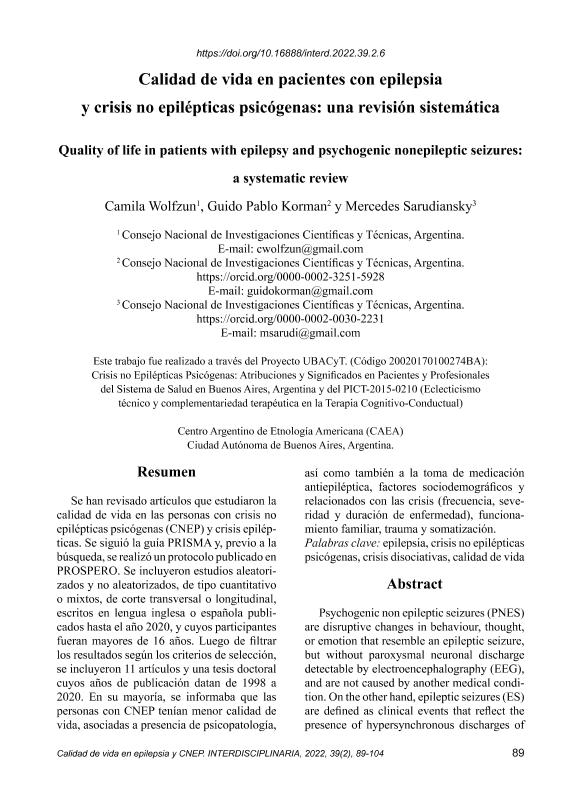Mostrar el registro sencillo del ítem
dc.contributor.author
Wolfzun, Camila

dc.contributor.author
Korman, Guido Pablo

dc.contributor.author
Sarudiansky, Mercedes

dc.date.available
2022-07-04T19:02:43Z
dc.date.issued
2022-05
dc.identifier.citation
Wolfzun, Camila; Korman, Guido Pablo; Sarudiansky, Mercedes; Calidad de vida en pacientes con epilepsia y crisis no epilépticas psicógenas: Una revisión sistemática; Centro Interamericano de Investigaciones Psicológicas y Ciencias Afines; Centro Interdisciplinario de Investigaciones en Psicología Matemática y Experimental; Interdisciplinaria; 39; 2; 5-2022; 89-104
dc.identifier.issn
0325-8203
dc.identifier.uri
http://hdl.handle.net/11336/161215
dc.description.abstract
Se han revisado artículos que estudiaron la calidad de vida en las personas con crisis noepilépticas psicógenas (CNEP) y crisis epilépticas. Se siguió la guía PRISMA y, previo a labúsqueda, se realizó un protocolo publicado en PROSPERO. Se incluyeron estudios aleatorizadosy no aleatorizados, de tipo cuantitativo o mixtos, de corte transversal o longitudinal, escritos en lengua inglesa o española publicados hasta el año 2020, y cuyos participantes fueran mayores de 16 años. Luego de filtrar los resultados según los criterios de selección, se incluyeron 11 artículos y una tesis doctoral cuyos años de publicación datan de 1998 a 2020. En su mayoría, se informaba que laspersonas con CNEP tenían menor calidad de vida, asociadas a presencia de psicopatología, así como también a la toma de medicación antiepiléptica, factores sociodemográficos y relacionados con las crisis (frecuencia, severidad y duración de enfermedad), funcionamiento familiar, trauma y somatización.
dc.description.abstract
Psychogenic non epileptic seizures (PNES) are disruptive changes in behaviour, thought, or emotion that resemble an epileptic seizure, but without paroxysmal neuronal discharge detectable by electroencephalography (EEG), and are not caused by another medical condition. On the other hand, epileptic seizures (ES) are defined as clinical events that reflect the presence of hypersynchronous discharges of neurons located in the cerebral cortex, which have the particularity of starting and ending abruptly. The diagnosis of epilepsy is made when an epileptic seizure was experienced and there is a risk of having another. The objective of this paper is to present the results of a systematic review of articles that have studied quality of life in people with PNES and ES. This review has been performed following the PRISMA guide (Preferred Reporting Items for Systematic reviews and Meta-Analyses). Prior to the beginning of the search, a protocol was carried out and it is published for consultation in the International prospective register of systematic reviews (PROSPERO). The review includes randomized and non-randomized, quantitative or mixed, cross-sectional or longitudinal studies, published in English or Spanish until 2020. In addition, participants had to be over 16 years old. PNES diagnosis must have been confirmed by video-electroencephalography (VEEG) or a similar procedure-which is considered the gold standard for the diagnosis of PNES. In regards to research, PubMed, SciELO, Cochrane Library, Lilacs, Dialnet and Science Direct databases were reviewed. In addition, authors from epilepsy centers in Argentina were contacted in order to obtain local data and references of included studies were reviewed. The quality of the articles was evaluated using the guidelines of a tool created in a previous review by Brown and Reuber for PNES studies. It has been chosen to present the data in a narrative synthesis. As a result of the search, 678 references were obtained and after eliminating duplicates, 614 results were left. After filtering the results according to the selection criteria, 11 articles and a doctoral thesis were included. Their publication years date from 1998 to 2020. Most of them (10) were developed in the United States, one in Turkey and one in Argentina. English language was prevalent, being the doctoral thesis the only one written in spanish. Regarding the quality of the studies, most of them (9) were rated as medium quality; two of them as low quality and one as high quality. In regard to the scales employed to measure quality of life, the most widely used was Quality Of Life in Epilepsy (QOLIE), and QOLIE-31 was the most frequently used version of the instrument. It was found that people with PNES had a lower quality of life, mostly associated with the presence of psychopathology. Depression constitutes the most recurrent factor, followed by anxiety and personality traits. These results are consistent with previous research and gain importance when analysing the high rates of psychiatric comorbidity found in both groups of patients. To a lesser extent, other factors have shown a relationship with quality of life: taking anti-epileptic drugs, seizure-related factors (frequency, severity, duration of the disease), family functioning, demographic factors (sex), trauma and somatization. This study has potential limitations, including methodological problems of the articles included (non-randomized studies, dissimilar sample sizes between groups), quality of life scales dissimilarity among studies, and not having performed a meta-analysis, which would have provided more detailed information. Nevertheless, in conclusion, it could be stated that, in general, people with PNES have a lower quality of life than people with epileptic seizures.
dc.format
application/pdf
dc.language.iso
spa
dc.publisher
Centro Interamericano de Investigaciones Psicológicas y Ciencias Afines; Centro Interdisciplinario de Investigaciones en Psicología Matemática y Experimental
dc.rights
info:eu-repo/semantics/openAccess
dc.rights.uri
https://creativecommons.org/licenses/by-nc-sa/2.5/ar/
dc.subject
Epilepsia
dc.subject
Crisis no epilépticas psicógenas
dc.subject
Crisis disociativas
dc.subject
Calidad de vida
dc.subject.classification
Otras Psicología

dc.subject.classification
Psicología

dc.subject.classification
CIENCIAS SOCIALES

dc.title
Calidad de vida en pacientes con epilepsia y crisis no epilépticas psicógenas: Una revisión sistemática
dc.title
Quality of life in patients with epilepsy and psychogenic nonepileptic seizures: A systematic review
dc.type
info:eu-repo/semantics/article
dc.type
info:ar-repo/semantics/artículo
dc.type
info:eu-repo/semantics/publishedVersion
dc.date.updated
2022-06-30T19:03:22Z
dc.identifier.eissn
1668-7027
dc.journal.volume
39
dc.journal.number
2
dc.journal.pagination
89-104
dc.journal.pais
Argentina

dc.journal.ciudad
Ciudad Autónoma de Buenos Aires
dc.description.fil
Fil: Wolfzun, Camila. Consejo Nacional de Investigaciones Científicas y Técnicas; Argentina. Universidad de Buenos Aires. Facultad de Psicología; Argentina. Centro Argentino de Etnología Americana; Argentina
dc.description.fil
Fil: Korman, Guido Pablo. Consejo Nacional de Investigaciones Científicas y Técnicas; Argentina. Universidad de Buenos Aires. Facultad de Psicología; Argentina. Centro Argentino de Etnología Americana; Argentina
dc.description.fil
Fil: Sarudiansky, Mercedes. Consejo Nacional de Investigaciones Científicas y Técnicas; Argentina. Universidad de Buenos Aires. Facultad de Psicología; Argentina. Centro Argentino de Etnología Americana; Argentina
dc.journal.title
Interdisciplinaria
dc.relation.alternativeid
info:eu-repo/semantics/altIdentifier/doi/https://doi.org/10.16888/interd.2022.39.2.6
dc.relation.alternativeid
info:eu-repo/semantics/altIdentifier/url/http://www.ciipme-conicet.gov.ar/ojs/index.php?journal=interdisciplinaria&page=article&op=view&path[]=816
Archivos asociados
